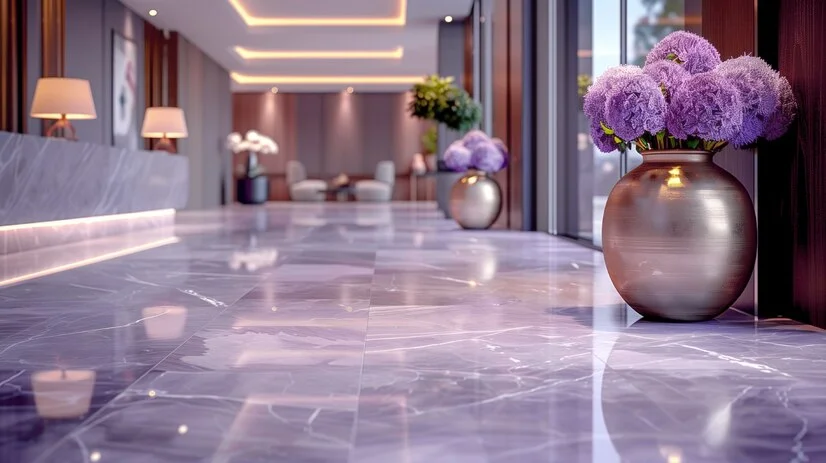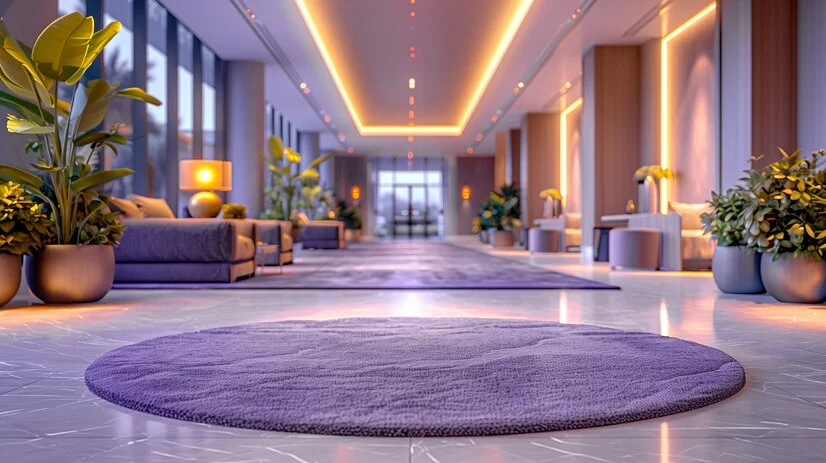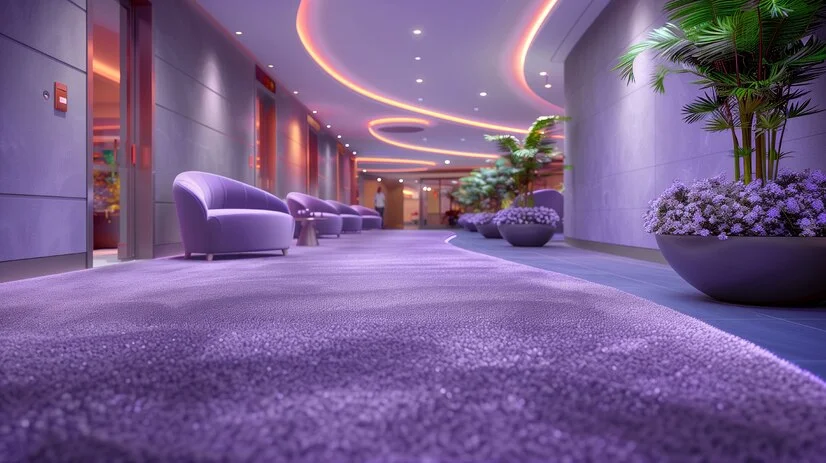Vinyl plank flooring has quickly become a favorite choice for homeowners and designers alike. It’s easy to install, budget-friendly, durable, and stylish. In this guide, we’ll cover everything you need to know about it, including why it’s so popular and the different types available. We’ll also look at how it compares to other flooring types, maintenance tips, and why waterproofing it is a game-changer.
What is Vinyl Plank Flooring?
Vinyl plank flooring is a type of synthetic flooring designed to mimic the look of natural materials like hardwood or stone. Made from layers of PVC, this flooring is durable, water-resistant, and easy to maintain. One of its key advantages is its ability to replicate the beauty of more expensive floors at a fraction of the price.
The top layer of this is a clear, durable wear layer that protects the design layer beneath, which is the part that looks like wood or stone. Underneath this, there are more layers that add stability, moisture resistance, and comfort.
Why is Vinyl Plank Flooring So Popular?
Affordability
One of the biggest reasons people choose it is its cost-effectiveness. Compared to hardwood or stone floors, vinyl planks are much cheaper, making it an ideal option for budget-conscious homeowners.
Durability
Vinyl plank flooring is incredibly durable and can withstand heavy foot traffic. It resists scratches and dents better than many traditional flooring types, making it perfect for busy households with pets and children.
Water Resistance
A huge advantage of this, particularly waterproof vinyl plank flooring, is its water resistance. It’s ideal for areas prone to moisture, such as kitchens, bathrooms, and basements. Unlike hardwood, it won’t warp, swell, or crack when exposed to water.

Easy Installation
Vinyl plank flooring is designed to be installed as a floating floor, which means you don’t need glue or nails. The planks simply click and lock into place. Many DIY enthusiasts choose it because it can be installed without professional help.
Low Maintenance
Maintaining it is simple. Regular sweeping and mopping are enough to keep it looking new for years. Unlike hardwood, it doesn’t need refinishing or sealing, and it resists stains and scratches better.
Types of Vinyl Plank Flooring
There are several types of vinyl plank flooring, each with different features that make them suitable for different environments. Below are the main types.
Luxury Vinyl Plank (LVP)
Luxury vinyl plank (LVP) is a higher-end option that offers the most realistic imitation of hardwood. LVP has thicker layers for extra durability and comfort underfoot. This makes it one of the best choices for homeowners looking to combine aesthetic appeal with functionality.
Waterproof Vinyl Plank Flooring
Waterproof flooring is a subcategory of LVP that’s completely impervious to water. It’s made with materials that resist water absorption, making it a perfect choice for bathrooms, kitchens, and laundry rooms.

Rigid Core Vinyl Plank Flooring
The rigid core of this has a core layer that adds extra stability and strength. It’s thicker than traditional vinyl planks and is often used in high-traffic areas or places with uneven subfloors.
Pros and Cons of Vinyl Plank Flooring
Like any flooring option, it has its advantages and disadvantages.
Pros:
- Affordability: Much cheaper than hardwood, stone, or ceramic flooring.
- Durability: Resistant to wear and tear, making it ideal for high-traffic areas.
- Waterproof Options: Ideal for moisture-prone areas like bathrooms and basements.
- Easy Installation: Many options are DIY-friendly.
- Low Maintenance: Requires minimal care.
Cons:
- Not as Luxurious as Natural Materials: While high-quality vinyl can mimic the appearance of hardwood, it’s still not the real thing.
- Vulnerable to Sharp Objects: Sharp objects can pierce vinyl plank flooring.
- Can Fade: Prolonged exposure to sunlight can cause the colors to fade over time.
Waterproof Vinyl Plank Flooring (A Revolution in Flooring)
Waterproof vinyl plank flooring is a major innovation in the flooring world. Unlike traditional vinyl, which is only water-resistant, waterproof vinyl planks offer complete protection against water damage. This type of flooring is made with multiple layers that prevent water from penetrating the surface, making it ideal for kitchens, bathrooms, and basements.
Benefits of Waterproof Vinyl Plank Flooring:
- Moisture Resistance: It can handle spills, humidity, and even standing water without warping.
- Durability: It resists stains, scratches, and dents.
- Easy to Clean: Spills can be wiped up without worry, making it ideal for families with children or pets.
Vinyl Planks vs. Other Flooring Types
Vinyl Plank Flooring vs. Hardwood
Hardwood is a timeless flooring option, but it comes with a higher price tag and maintenance requirements. This, particularly LVP, can mimic the look of hardwood while being more affordable, water-resistant, and easier to maintain. However, if you’re looking for real wood’s authentic feel and character, it may fall short.

Vinyl Plank Flooring vs. Laminate
Both laminate and vinyl plank flooring are budget-friendly alternatives to hardwood, but they have some key differences. Laminate is made from wood byproducts, while vinyl plank flooring is 100% synthetic. it tends to be more water-resistant and durable, making it a better option for moisture-prone areas. Laminate can swell and warp when exposed to water, whereas waterproof vinyl plank flooring can handle spills with ease.
Maintenance and Care for Vinyl Plank Flooring
Maintaining it is simple, but there are a few steps you should take to keep it looking its best.
Regular Cleaning
Sweep or vacuum your floor regularly to remove dust and debris. For deeper cleaning, use a damp mop and a gentle cleaner designed for vinyl floors. Avoid harsh chemicals that can strip the protective wear layer.
Avoid Scratches
While it is durable, it’s not completely immune to scratches. Use felt pads under furniture and avoid dragging heavy objects across the floor.
Protection from Sunlight
Direct sunlight can cause it to fade over time. Use blinds or curtains to protect your flooring from UV exposure.
Mop Spills Quickly
Although waterproof vinyl plank flooring can handle water, it’s always a good idea to clean up spills as soon as possible to prevent any potential damage.
How to Choose the Right Vinyl Plank Flooring
When choosing it, there are several factors to consider.

Room Location
For moisture-prone areas like kitchens and bathrooms, waterproofing it is the best choice. For living rooms and bedrooms, standard LVP or rigid core flooring will provide the necessary durability and comfort.
Traffic Levels
If you have high foot traffic or pets, opt for it with a thicker wear layer to prevent scratches and dents.
Aesthetic
Choose a vinyl plank design that complements your home’s style. Whether you prefer the look of natural wood or stone, there are plenty of options to suit your taste.
Budget
Vinyl plank flooring is available at a wide range of price points. While luxury flooring may cost more upfront, its durability and water resistance make it a worthwhile investment for high-traffic or moisture-prone areas.
Conclusion
Vinyl plank flooring has transformed the flooring industry with its affordability, durability, and versatility. Whether you’re looking for a low-maintenance solution for a busy household or a stylish, waterproof option for a bathroom, it is a top contender. With options like luxury flooring and waterproof flooring, you can find the perfect fit for any room in your home.





Leave a Reply